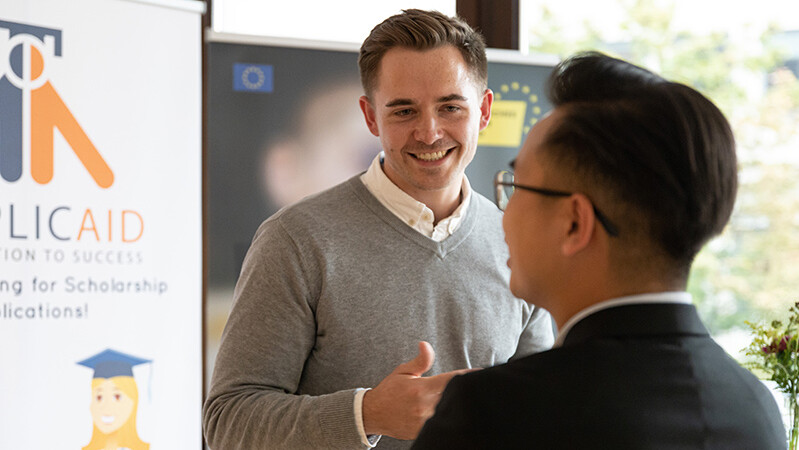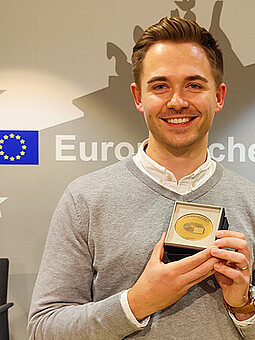Supporting equal access to scholarships

Patrik Staak of ApplicAid advises students on applying for scholarships.

Congratulations on the award! Can you tell us briefly how the project came about?
I myself am the first person in my family to go to university. I only found out about scholarships through friends and acquaintances – including Backtosch Mustafa, for example, whom I had already worked with on several volunteer projects.
After we had thought more about the topic of scholarships, we came across a scholarship study done by the Mercator Foundation. The study looked at equality of access in the German scholarship system. It confirmed our experiences and those of many people we knew that there were differences in access to scholarships depending on people's backgrounds. People from educationally disadvantaged backgrounds apply for scholarships less often, receive less support from those around them, and have a lower chance of being awarded a scholarship when they apply.
The idea for ApplicAid was born in 2018 based on this information. Since 2020 we've been a registered non-profit society. What we want to accomplish through the initiative is that every person has the same chance to realise his or her abilities, talents and potential – independently of their social, ethnic or financial background. Young, talented people from educationally disadvantaged groups should be given assistance in their attempts to receive a scholarship and thus supported over the long term.
What was your own experience like?
At the beginning of my biotechnology degree at HAW Hamburg I did know that there was such a thing as scholarships, but I still felt kind of helpless and also believed a lot of stereotypes. Suitability, self-doubt and the huge amount of effort required initially kept me from applying for a scholarship.
Questions like 'Which scholarship is right for me?', 'How do I apply successfully for a scholarship?, or 'Am I really good enough for that?' were on my mind regularly. Without my circle of friends and family, who always encouraged me, these questions would still be unanswered today. And although over time I've been turned down for many of the scholarships I've applied for, I've always been able to take something away from the process. Because scholarship applications often require a lot of self-reflection. Both the motivation behind your application as well as questions about your own identity are often touched upon: Who am I and who do I want to become? All of that helped me with future scholarship applications and in my own personal development.
Because I know how our target group feels – since I'm also part of it – I'm actively working for more educational justice within the scholarship system.
What does the mentoring programme look like?
Volunteer mentors who were themselves able to study on a scholarship advise mentees who are applying for the same scholarship, or a similar one, but don't know how they should go about it. Often people have fears and reservations that have to be dealt with first. Later we focus on the application letter and the application documents. The programme runs for six weeks in total. Those of us working at ApplicAid try to match the right mentors and mentees. So far we've managed to do this successfully around 400 times!
What tips do you have for students at HAW Hamburg?
HAW Hamburg has a good overview of scholarships on its website:
HAW-Hamburg: Scholarships
In addition to information about the Deutschlandstipendium and the 13 large funding programmes for gifted students, there are also scholarships for international students and scholarships for study stays abroad. The latter are especially interesting. For example, it is possible to complete a study semester or an internship at a European partner university with Erasmus+ or in the USA or Australia with PROMOS.
And if someone is interested in a shorter stay abroad, the programmes from Fulbright, the summer school funding or the HAW International scholarship for trade fairs and congresses offer very good support. The offers are there and are just waiting to be used!
There's also no need to worry that a degree will automatically be made longer by completing a study stay abroad. At most universities it is usually possible to have internships and required courses recognised. A talk with a student advisor is a good way to answer lots of questions related to this. I was able to do a study stay abroad through Erasmus+ during my degree. I reported on my experiences as the HAW Hamburg DAAD correspondent on the study worldwide website and my social media accounts. I hope to motivate lots of students to pursue similar stays!
If people have additional questions or need support, ApplicAid is also happy to help.
Thank you! We wish you and the other volunteers continued success with your work!
The European Citizen's Prize
The European Citizen's Prize recognises projects that contribute to European cooperation and the promotion of joint European values. Because this year was declared the European Year of Youth, projects for young people were given priority in the selection process. The national awards ceremony was held on 19 September 2022 at the European House in Berlin. In November, all of the winners will be presented with their medals at the European Parliament in Brussels.
